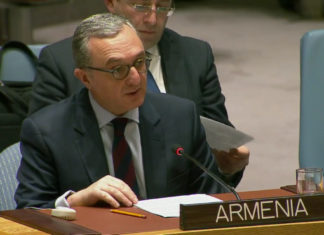MOSCOW (RFE/RL) — Russian defense officials made on Monday conflicting statements about reports that Moscow plans to sell sophisticated air-defense systems to Azerbaijan that could affect the balance of forces in the Nagorno Karabagh conflict.
Citing Russian arms industry sources, Russia’s Vedomosti business daily reported last week that Azerbaijan last year signed a deal with the Rosoboronexport arms exporter to purchase two batteries of S-300 anti-aircraft systems worth $300 million. A Rosoboronexport spokesman denied the report, saying that the state-run company “has no contractual obligations whatsoever on this matter.”
The Interfax news agency quoted on Monday an unnamed “high-ranking source” from the Russian Defense Ministry as calling the report “nonsense.” “Today, the supply of Russian S-300s to Azerbaijan is impossible for primarily political reasons,” he said, pointing to the unresolved Karabagh dispute.
“Given the complicated relations between Yerevan and Baku, the export of S- 300s to Azerbaijan would no doubt destroy the balance of forces in the region. Besides, Armenia is Russia’s ally within the CSTO [Collective Security Treaty Organization] and Yerevan could see such arms contracts between Moscow and Baku as a betrayal,” the official added, according to Interfax.
However, another unnamed ministry source quoted by the Moscow daily Nezavisimaya Gazeta claimed the opposite, downplaying the Rosoboronexport denial.
“This deal is only being planned and negotiated, but a decision to that effect has already been made, in principle, by the [Russian] government,” he said.









